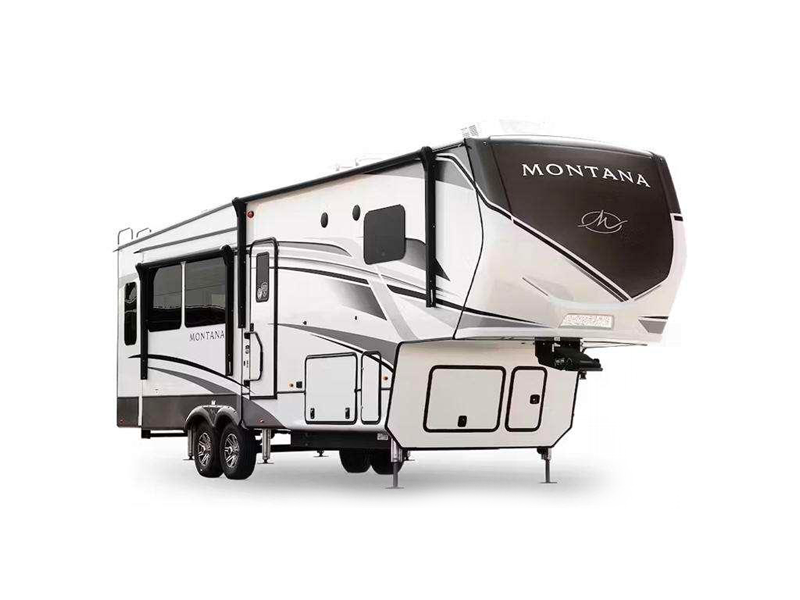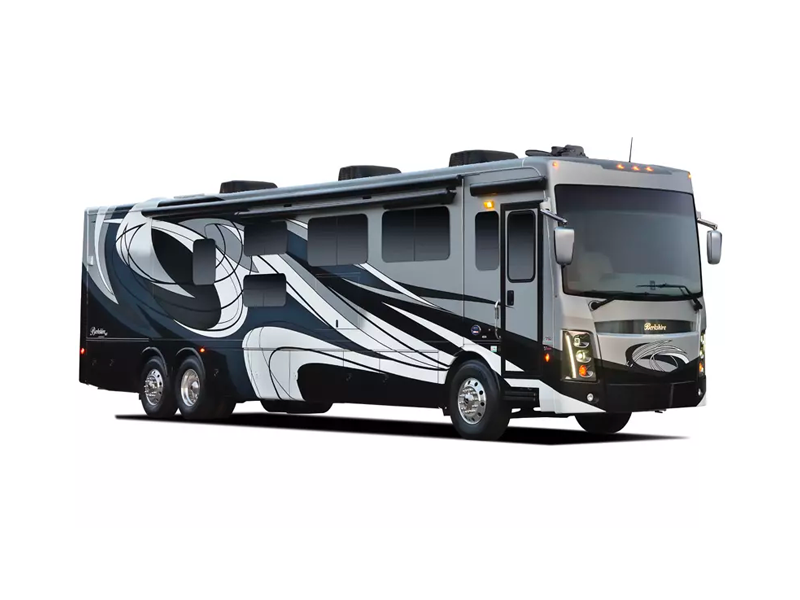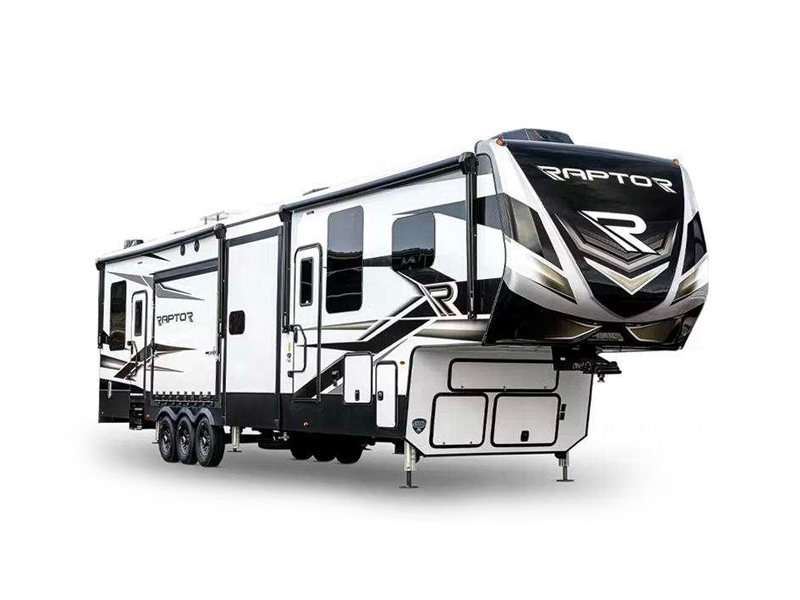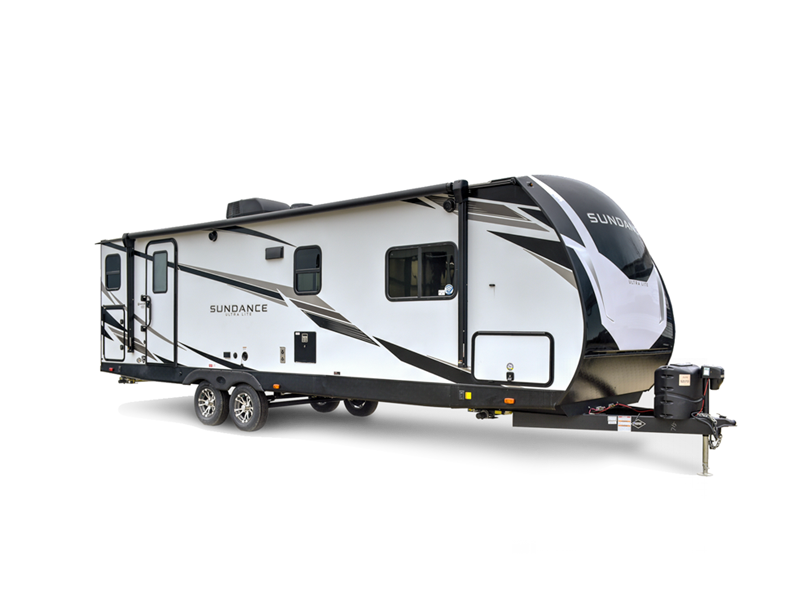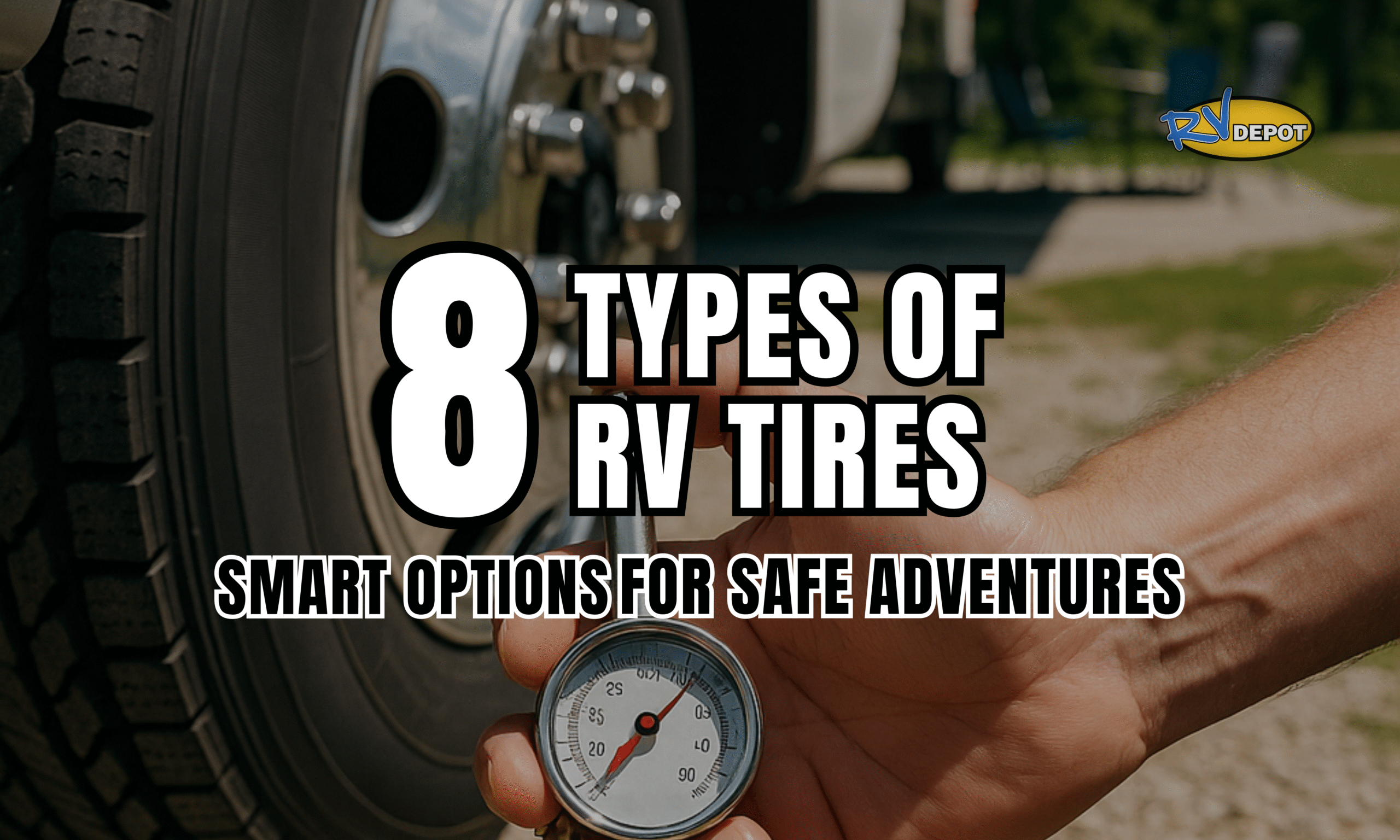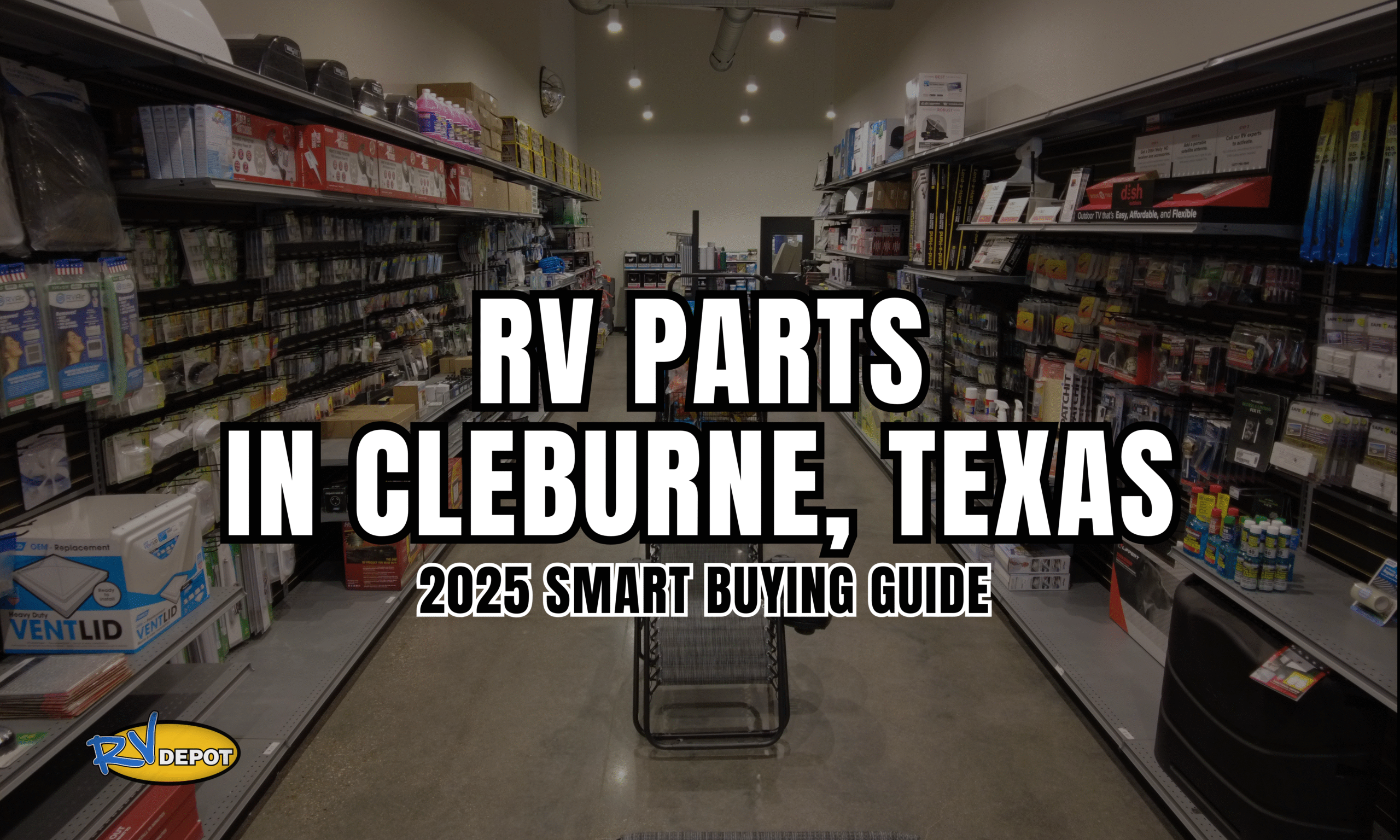When your RV is your home—not your vacation vehicle—the conversation about types of RV tires changes completely. You’re not worried about highway performance or fuel economy. You’re concerned about your home’s foundation staying stable, safe, and damage-free while it sits in one spot for months or years at a time.
At RV Depot, we understand that many of our customers aren’t chasing sunsets across America. They’re escaping rent, rebuilding after hardship, or simply choosing a smarter way to live. Your RV might move once to its permanent spot and then stay there. That doesn’t mean tires don’t matter—in fact, proper tire selection and care becomes even more critical when your RV is stationary.
The Hidden Truth About Stationary RV Tires
Here’s what nobody tells you about types of RV tires for stationary living: sitting still can be harder on tires than driving. When your 20,000-pound home sits on the same spot of rubber month after month, unique problems develop:
The Stationary Tire Challenges:
- Flat spotting: Constant pressure on one spot deforms the tire
- Sidewall cracking: UV exposure without movement accelerates deterioration
- Dry rot: Lack of flexing allows rubber to become brittle
- Uneven aging: The bottom portion ages faster than the top
- Weather checking: Temperature cycles cause surface cracking
These issues can turn your stable home into an unstable liability, potentially causing:
- Sudden tire failure when you do need to move
- Structural damage to your RV frame
- Safety hazards during necessary relocations
- Expensive emergency tire replacements
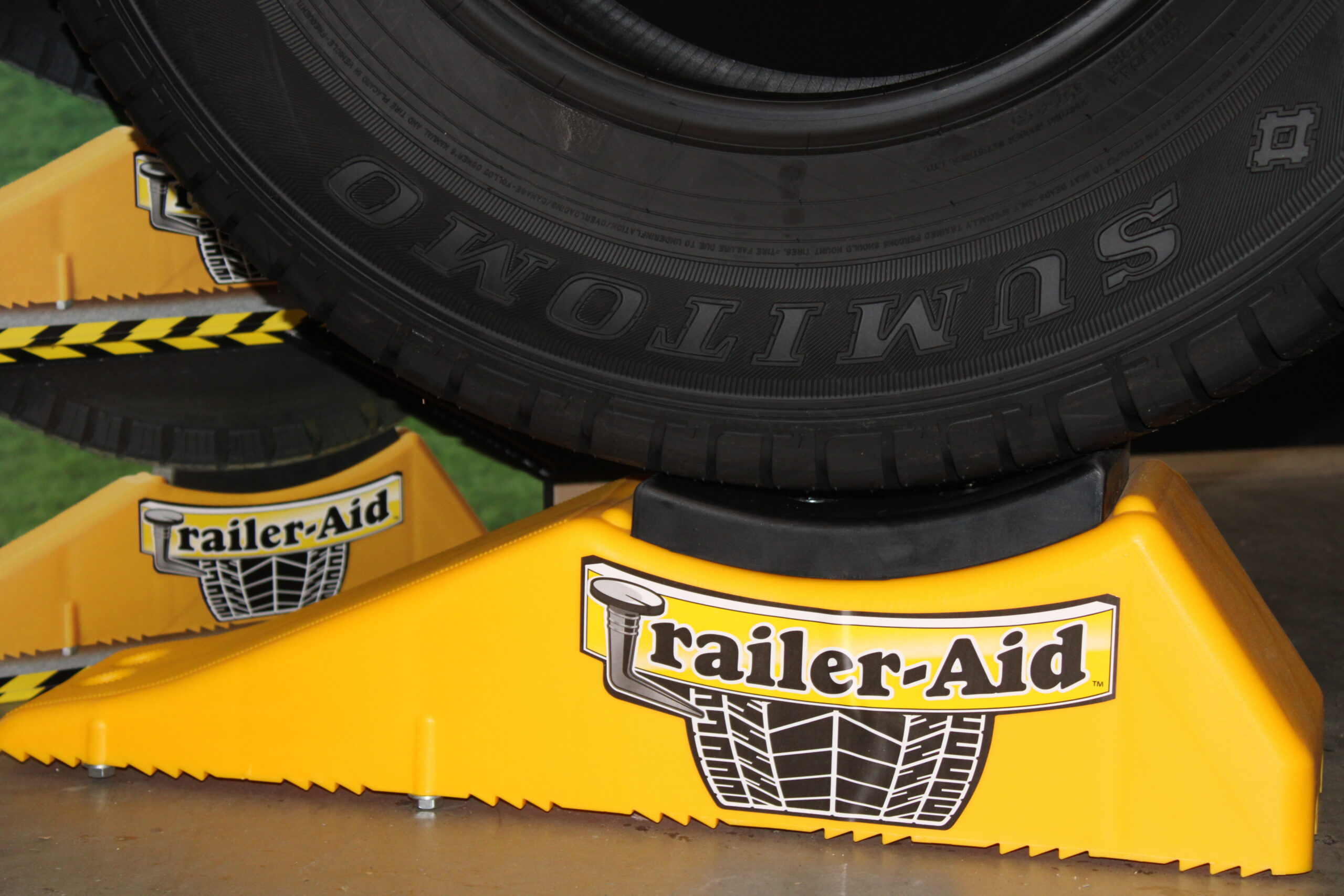
8 Essential Types of RV Tires for Every Adventure
1. ST (Special Trailer) Tires – The Towable Specialist
For towable RVs that will be parked long-term, ST tires remain the standard—but with important considerations:
Stationary Living Reality:
- Designed for 65-75 mph speeds you’ll never reach
- Sidewalls built for sway control you don’t need
- Higher load ratings perfect for stationary weight
What Actually Matters:
- UV resistance of sidewall compounds
- Maximum load capacity for your setup
- Age rating and warranty coverage
- Cost-effectiveness for one-time positioning
Budget Tip: Since you’re not wearing out tread, focus budget on UV-resistant sidewall protection rather than tread ratings.
2. LT (Light Truck) Tires – The Versatile Performer
For motorhomes and heavy towables in permanent positions, LT tires offer advantages:
Why They Work for Stationary Living:
- Thicker sidewalls resist cracking
- Higher weight ratings provide safety margin
- Readily available at local tire shops
- Often less expensive than specialty RV tires
The Trade-Off: You’re paying for highway performance you won’t use, but gaining durability that matters for long-term parking.
3. Commercial/Highway RV Tires – The Long-Distance Champion
For the heaviest RVs serving as permanent homes, commercial-grade tires provide:
- Tread Life: 80,000-100,000+ mile ratings common
- Fuel Efficiency: Low rolling resistance compounds
- Heat Dissipation: Advanced rubber compounds prevent blowouts
- Noise Reduction: Computer-optimized tread patterns
Specific Applications:
- Class A motorhomes on major highways
- Long-distance touring and full-time RV living
- Commercial RV rental fleets
Performance Data:
- Fuel economy improvement: 3-7% over all-terrain alternatives
- Noise levels: 68-72 decibels (significantly quieter than A/T tires)
4. All-Terrain (A/T) Tires – The Adventure Ready Option
Tread Design Features:
- Void Ratio: 25-35% for balanced on/off-road performance
- Siping: Micro-grooves for wet weather traction
- Shoulder Design: Aggressive lugs for side-hill traction
Performance Trade-offs:
- Road noise: 10-15% louder than highway tires
- Fuel economy: 5-10% reduction compared to highway tires
- Tread life: 60,000-80,000 miles typical
Ideal Conditions:
- National forest campgrounds with gravel access roads
- Beach camping on hard-packed sand
- Light off-road exploration
5. Mud-Terrain (M/T) Tires – The Extreme Off-Road Specialist
Aggressive Design Elements:
- Void Ratio: 40-50% for maximum traction
- Sidewall Lugs: Extended tread for enhanced side-hill grip
- Self-Cleaning: Open tread pattern prevents mud packing
Performance Reality Check:
- Road Noise: 15-25% louder than highway tires
- Fuel Economy Impact: 15-20% reduction
- Pavement Wear: 25-40% faster wear on highways
- Ride Quality: Noticeably harsher on paved surfaces
Appropriate Applications:
- Serious off-road RV adventures (Moab, Baja, etc.)
- Seasonal access to remote campsites
- RVs used primarily off-road
6. Winter/Snow RV Tires – The Cold Weather Safety Essential
Winter tires are legally required in many states and provinces during winter months. Failure to use proper winter tires can void insurance coverage in some jurisdictions. So please check your state for requirements.
Rubber Compound Technology:
- Temperature Flexibility: Remains pliable below 45°F
- Tread Compound: Silica-enhanced for ice traction
- Tread Depth: Typically 12/32″ to 14/32″ new
Specialized Features:
- 3PMSF Symbol: Three Peak Mountain Snowflake certification required
- Siping Density: 2-3x more than standard tires
- Directional Tread: Often designed for optimal snow evacuation
7. Super Single Tires – The Modern Motorhome Upgrade
Super single rv tires replace dual wheel setups on large motorhomes:
Advantages:
- Weight Reduction: 200-400 lbs per axle
- Fuel Economy: 2-5% improvement
- Maintenance: Single tire inspection vs. dual setup
- Improved Handling: Better weight distribution
Considerations:
- Load Capacity: Must match or exceed dual tire rating
- Spare Requirements: Larger, heavier spare tire needed
- Cost: Higher individual tire cost
8. Retread Tires – The Budget-Conscious Option
Professional Retreading Process:
- Inspection: Thorough casing evaluation
- Preparation: Buffing to remove old tread
- Application: New tread bonded to casing
- Curing: Controlled heat and pressure process
Quality Standards:
- DOT Certification: Same safety standards as new tires
- Warranty: Typically 25,000-50,000 miles
- Cost Savings: 30-50% less than new equivalent
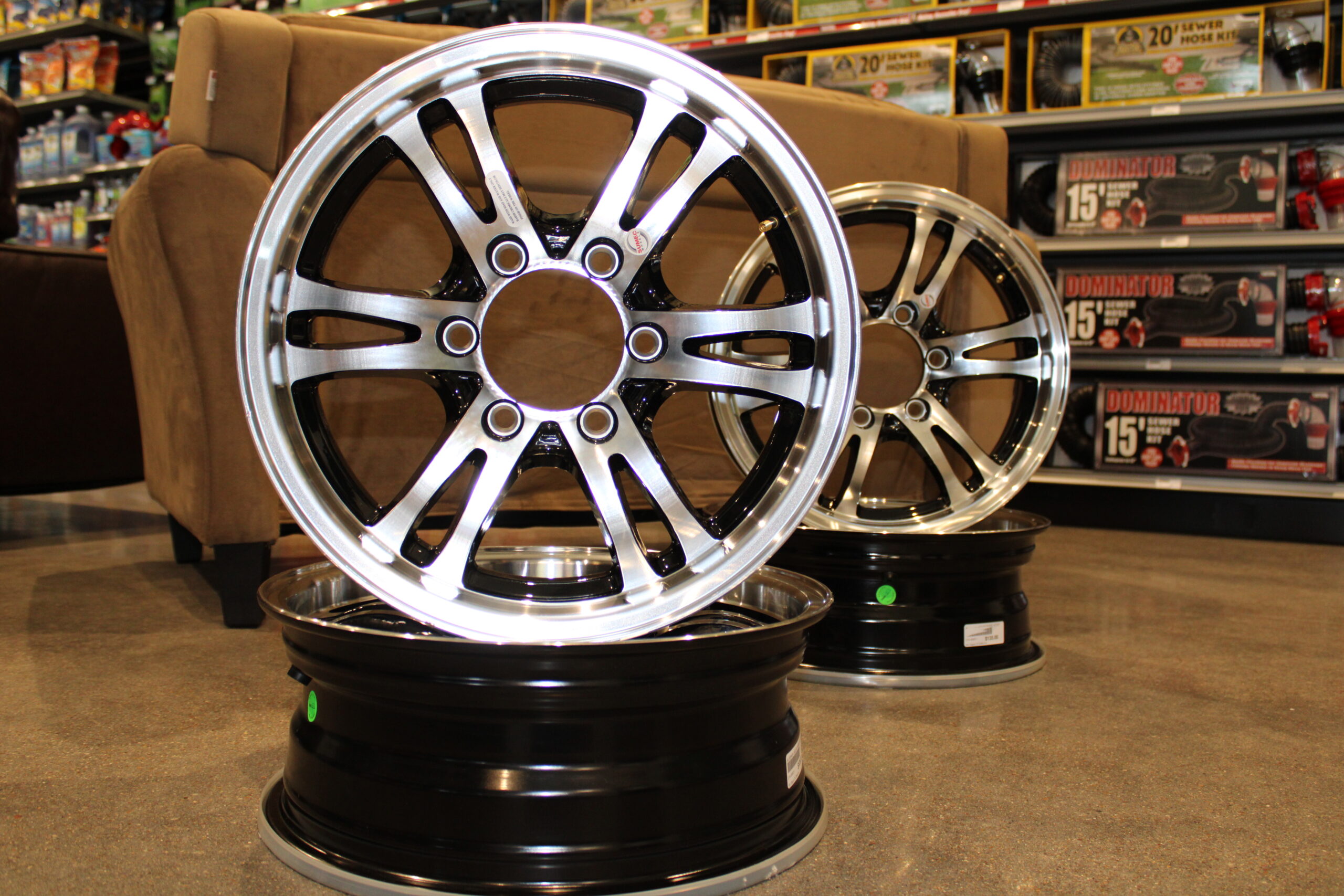
The Real Cost of Tire Neglect in Stationary RVs
When budgets are tight and you’re not driving anywhere, it’s tempting to ignore tires. Here’s why that’s dangerous:
Emergency Move Scenarios:
- Natural disasters requiring evacuation
- RV park closure or sale
- Family emergencies requiring relocation
- Better housing opportunities arising
Financial Impact of Tire Failure:
| Scenario | Cost Impact |
|---|---|
| Roadside tire failure during emergency move | $500-1,500 per tire |
| Towing due to multiple tire failures | $1,000-3,000 |
| Frame damage from blowout | $2,000-10,000 |
| Lost possessions from accident | Priceless |
| Temporary housing during repairs | $100-200/night |
Protecting Your Investment: Tire Care for Stationary RVs
Understanding types of RV tires is only half the battle. Proper care determines whether your tires last 3 years or 7 years in stationary use.
Essential Monthly Maintenance (10 Minutes):
- Visual Inspection
- Check for sidewall cracks
- Look for weather checking
- Inspect tread separation
- Note any bulges or deformities
- Pressure Check
- Maintain manufacturer’s recommended PSI
- Stationary tires lose pressure faster
- Low pressure accelerates all damage
- Over-inflation causes center wear
- UV Protection
- Apply tire dressing monthly (water-based only)
- Never use petroleum-based products
- Focus on sidewall protection
Quarterly Maintenance (30 Minutes):
- Rotation Prevention
- Move RV forward/backward 6-12 inches
- Prevents permanent flat spots
- Flexes rubber to prevent brittleness
- Can be done with vehicle or by hand
- Load Distribution Check
- Ensure RV remains level
- Check for shifting that overloads tires
- Adjust leveling blocks as needed
- Cover Installation/Inspection
- Tire covers are mandatory for stationary RVs
- Check covers haven’t blown off
- Replace damaged covers immediately
The 6-Year Rule: Why Age Matters More Than Miles
For stationary RVs, the critical fact about types of RV tires isn’t their speed rating or tread pattern—it’s their age. The rubber compounds in all tires deteriorate over time, regardless of use.
Understanding Date Codes:
- Located on tire sidewall
- Four digits: Week and Year (2319 = 23rd week of 2019)
- Replace at 6 years regardless of appearance
- Some insurance requires 5-year replacement
Age-Based Replacement Budget:
- Plan for full replacement every 6 years
- Budget $200-600 per tire (depending on size)
- Consider staggered replacement if possible
- Keep documentation for insurance
Emergency Preparedness for Stationary RV Tires
When your RV hasn’t moved in years, emergency relocation requires special preparation:
Pre-Move Checklist:
- 24 Hours Before:
- Increase tire pressure to maximum sidewall rating
- Remove tire covers and cradles
- Inspect thoroughly with flashlight
- Check spare tire condition and pressure
- Day of Move:
- Drive slowly for first mile
- Stop and check for vibrations
- Monitor tire pressure if possible
- Have roadside assistance number ready
- If RV Tires Show Damage:
- Don’t risk it—replace before moving
- Mobile tire service can come to you
- Used tires acceptable for short moves
- Document everything for insurance
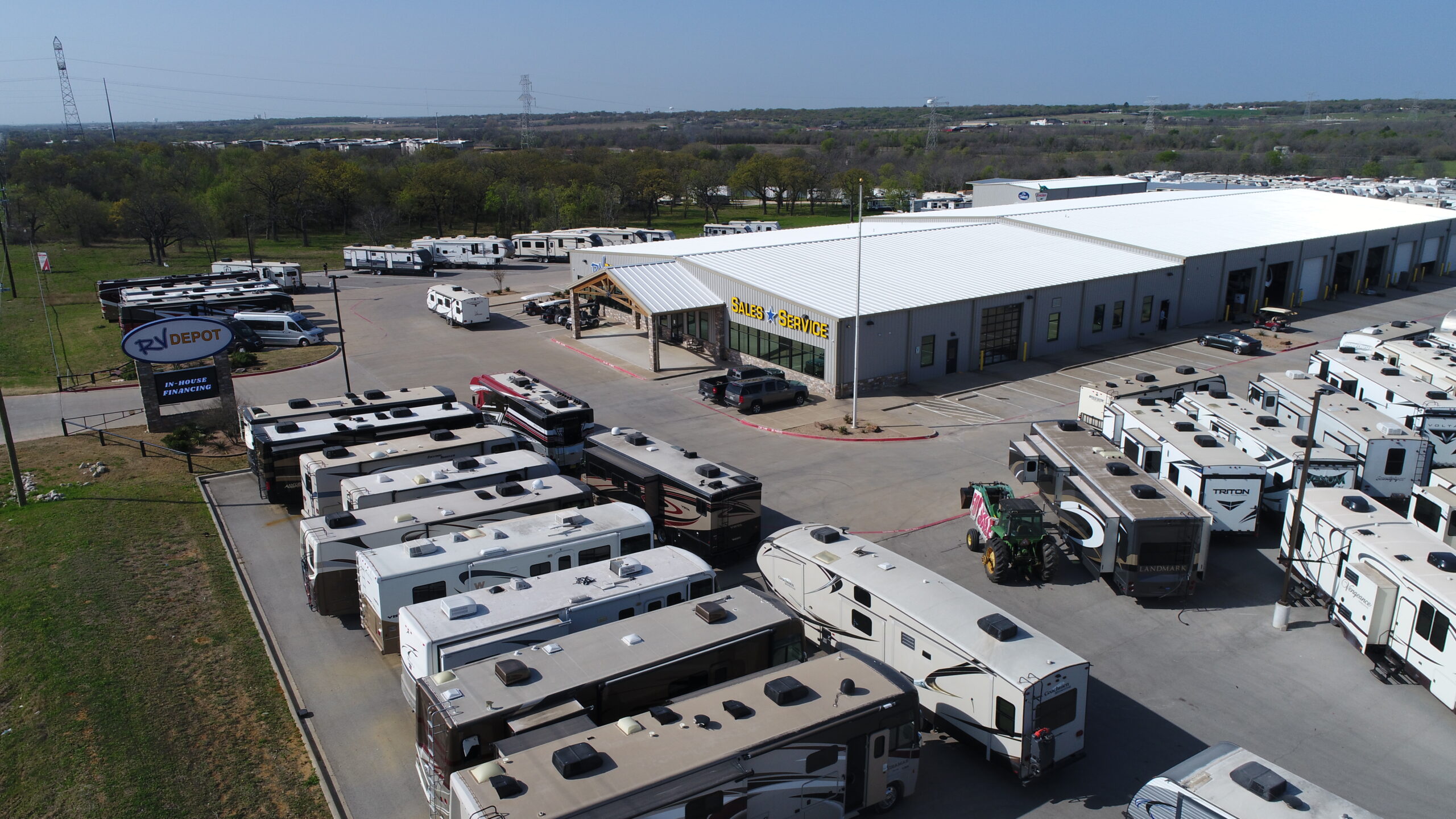 RV Depot: Your Expert Partner for Types of RV Tires
RV Depot: Your Expert Partner for Types of RV Tires
At RV Depot in Cleburne, Texas, we’ve watched the RV industry evolve over our 30+ years in business. Today, we’re proud to serve a growing community of Texans who see RVs differently—not as vacation vehicles, but as smart housing solutions. When traditional apartments demand $1,400+ monthly with nothing to show for it, RVs offer actual ownership, reduced costs, and genuine freedom.
We understand you’re not chasing tourist destinations. You’re building a life, raising a family, working remotely, or enjoying retirement on your terms. Your rv tires might move once—from our lot to your permanent spot—and that’s perfectly fine. We support your stationary lifestyle with services designed for people who live in, not just travel in, their RVs.
Convenient Service Options:
- On-Site Service: Full-service department for installation and maintenance
- Flexible Scheduling: Service appointments that work with your schedule
- Warranty Support: Help with manufacturer warranty claims and service
Our team includes staff who’ve lived the full-time RV life themselves. They understand the daily realities, from managing limited budgets to handling unexpected maintenance. When you call with questions about types of RV tires for stationary use, you’ll talk to someone who genuinely understands your situation.
Remember: Your Home Deserves Proper Care
Your RV might not cruise America’s highways, but it shelters your dreams, protects your family, and builds your future. Every tire covered, every pressure check completed, and every preventive measure taken ensures your home remains the stable foundation you need. At RV Depot, we’re more than a dealership—we’re your partners in making RV living work. From selecting the right RV to maintaining it for years of comfortable living, we’re here every step of the way.
Contact RV Depot Today:
- Expert Consultation: Call (817) 678-5133
- Visit Our Showroom: 4319 N. Main St, Cleburne, TX
Don’t wait for tire problems to find you. Take control of your RV’s foundation today.
Living full-time in your RV? Join our Facebook community to share stationary living tips and connect with others who’ve chosen affordable RV housing. Your home might not roll down the highway, but it still deserves proper care.

